Top 10 Free Websites to Learn Coding: Learning to code has never been more accessible, or more essential. Whether you’re eyeing a career in tech, hoping to build your own app, or just curious about how software works, knowing how to code opens up countless doors. But here’s the best part: you don’t have to spend a dime to get started.
There are hundreds of free coding websites, but not all of them are beginner-friendly or worth your time. That’s why we’ve curated the Top 10 Free Websites to Learn Coding, updated for 2025, to help you start strong.
Whether you’re learning HTML to build a website, Python to automate tasks, or JavaScript to dive into web development, this list has something for you. Let’s dig in.
Why Learn Coding for Free?
Coding is the literacy of the digital age. From smartphones to smart fridges, code is behind almost everything we use daily. As businesses continue to go digital, the demand for developers, data analysts, and tech-savvy professionals is skyrocketing.
But here’s the truth: formal computer science degrees aren’t the only path anymore. You can learn to code from your bedroom, coffee shop, or anywhere with Wi-Fi, for free.
Free coding platforms lower the barrier to entry. They’re perfect for:
- People testing the waters before committing to a paid course
- Career switchers wanting to upskill on a budget
- Students seeking supplemental resources
Moreover, many of these sites offer interactive lessons, project-based learning, and community support, which makes the experience engaging and effective.
Top 10 Free Websites to Learn Coding
1. freeCodeCamp
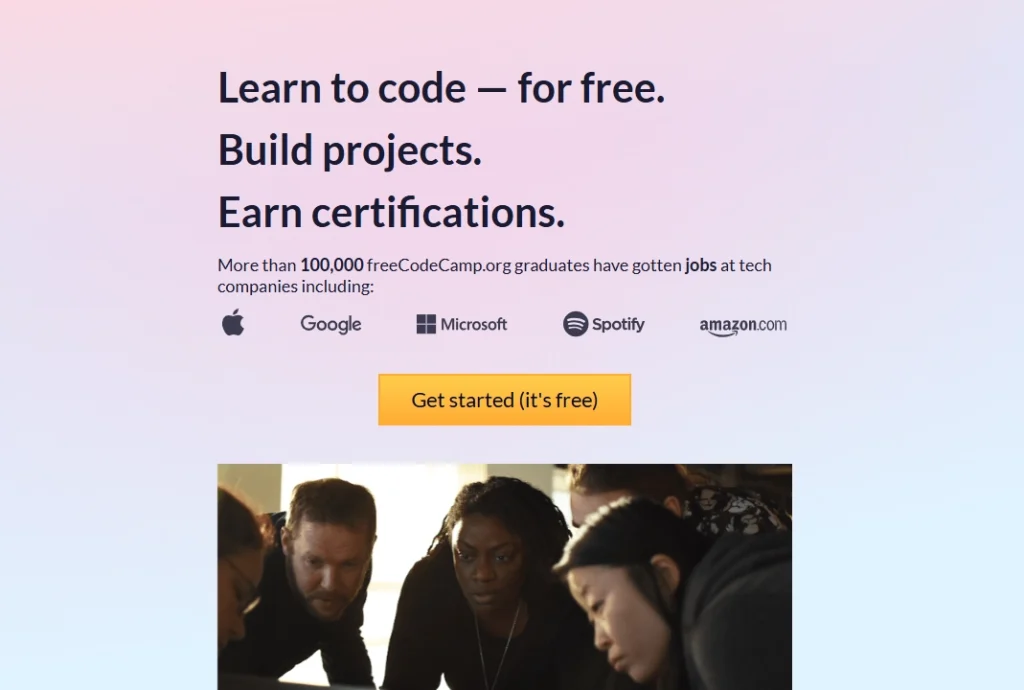
freeCodeCamp is one of the most beloved platforms in the programming world. Whether you’re a complete beginner or looking to brush up your skills, this non-profit platform offers a complete learning experience. It features thousands of interactive coding lessons, video tutorials, articles, and hands-on projects that help you learn by doing.
What makes freeCodeCamp truly stand out is its commitment to accessibility and structured learning. You start with basics such as HTML, CSS, and JavaScript and gradually move to more advanced topics like APIs, Machine Learning with Python, and even Interview Prep. Each course culminates in certification, and best of all, everything is 100% free.
The platform also includes real-world projects. After completing certain modules, you can contribute to nonprofit organizations as a part of the curriculum, building your portfolio and making a real impact.
freeCodeCamp’s unique feature is its structured, certification-based learning paths. This helps learners stay motivated and progress with a sense of achievement.
| Website Name | freeCodeCamp |
|---|---|
| Best For | Beginners to Intermediate Learners |
| Languages Covered | HTML, CSS, JavaScript, Python, SQL |
| Free Features | Courses, Certifications, Projects, Forums |
| Unique Feature | Certification-based structured curriculum |
2. Codecademy (Free Plan )
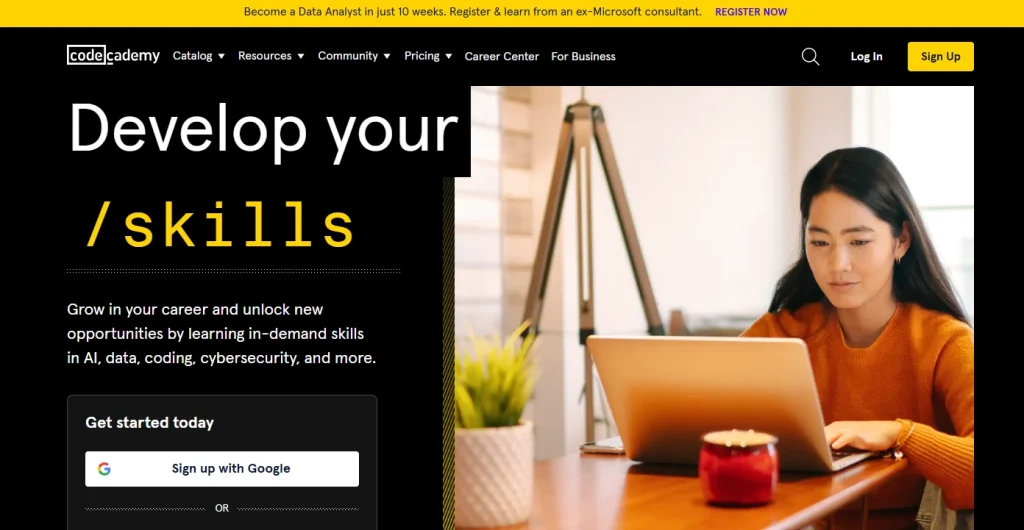
Codecademy is another well-known platform that offers interactive coding lessons. While it also has a paid Pro plan, the free version is incredibly valuable. You get access to basic courses in web development, Python, Java, JavaScript, and more. The interface is sleek, and the instant browser-based feedback makes learning easy and fun.
With Codecademy, you don’t need to install any software, just jump in and start coding. This is ideal for beginners who might be intimidated by setup processes. You’ll find structured courses with bite-sized lessons, quizzes, and small projects to reinforce your skills.
However, advanced content and career paths require a Pro subscription, but the free plan is still good enough to build strong foundational skills.
| Website Name | Codecademy (Free Plan) |
|---|---|
| Best For | Absolute Beginners |
| Languages Covered | Python, JavaScript, HTML, CSS, Java |
| Free Features | Basic Courses, Quizzes, Practice |
| Unique Feature | Interactive coding right in the browser |
3. Coursera (Free Courses)
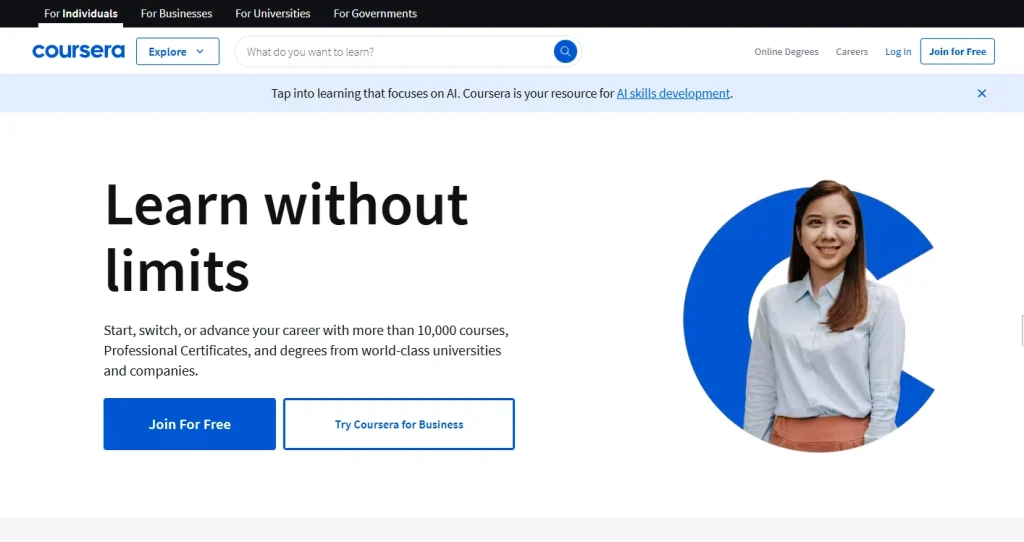
Coursera partners with top universities like Stanford, Duke, and companies like Google to offer world-class courses. While it’s known for paid degrees and certificates, many courses can be audited for free. This means you can access all the course materials, videos, readings, and assignments, without paying.
Coursera covers a wide range of topics including Python, web development, data science, machine learning, and more. The teaching style is academic, so it’s perfect for learners who prefer structured university-like classes. You can also find guided projects and peer-reviewed assignments to deepen your understanding.
One of Coursera’s key features is its university-level teaching and flexibility to audit courses for free.
| Website Name | Coursera (Free Courses) |
|---|---|
| Best For | Structured, Academic Learning |
| Languages Covered | Python, JavaScript, R, SQL, C++, HTML, CSS |
| Free Features | Course materials (audit mode), Projects |
| Unique Feature | University-level courses with free auditing |
4. The Odin Project
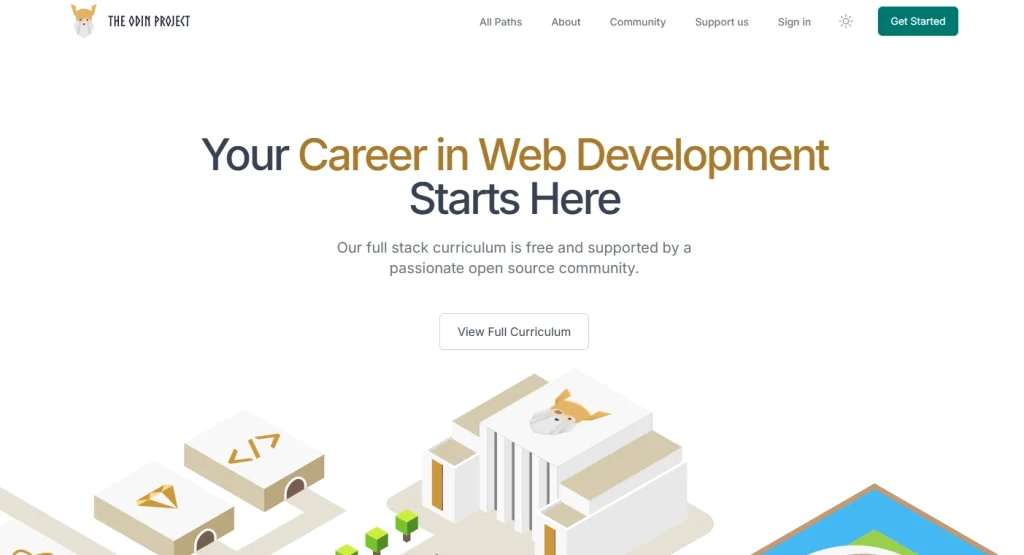
The Odin Project is a completely free, open-source curriculum that focuses on full-stack web development. It’s project-based and community-driven, offering everything from beginner HTML/CSS lessons to advanced JavaScript, Node.js, and React.
What sets The Odin Project apart is how it mimics the workflow of actual web developers. You learn theory, practice through guided projects, and then build your own portfolio-worthy applications. It’s an ideal path if you want to become a full-stack developer and need a roadmap to follow.
The platform is entirely free and includes links to external resources, GitHub integration, and community support through Discord.
The Odin Project’s standout feature is its full-stack curriculum that’s built around real-world projects.
| Website Name | The Odin Project |
|---|---|
| Best For | Aspiring Full-Stack Developers |
| Languages Covered | HTML, CSS, JavaScript, Node.js, React |
| Free Features | Full Curriculum, Projects, Community |
| Unique Feature | Project-based full-stack learning |
5. Khan Academy

Khan Academy is well-known for its school-level education materials, but it also offers solid programming lessons, especially for beginners and young learners. Its coding content focuses mainly on JavaScript, HTML/CSS, and drawing/animations using code.
The teaching method here is highly interactive and visual, which makes it easier to grasp tough concepts. The lessons are structured as videos and interactive exercises, where students can experiment with code while learning.
Khan Academy is ideal for people who want to ease into coding, especially kids and hobby learners. There’s no pressure to complete certificates or big projects, just fun and engaging learning.
Khan Academy’s unique strength lies in its interactive and visual approach to teaching coding.
| Website Name | Khan Academy |
|---|---|
| Best For | Beginners, Kids, Hobby Learners |
| Languages Covered | JavaScript, HTML, CSS |
| Free Features | Videos, Interactive Exercises, Quizzes |
| Unique Feature | Highly visual and beginner-friendly teaching |
6. Harvard’s CS50 (via edX)
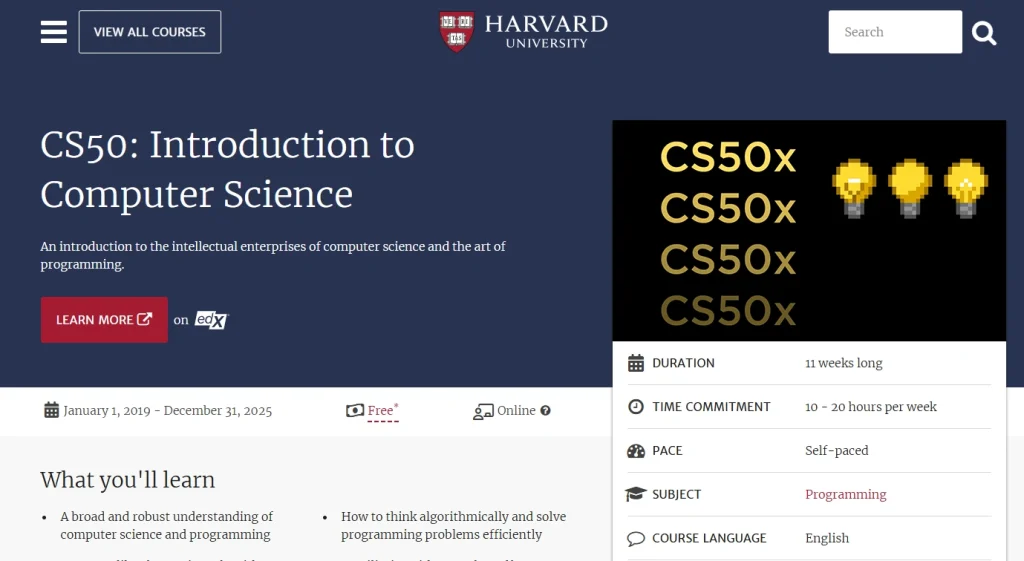
Harvard’s CS50 is one of the most popular introductory computer science courses in the world. Available for free via edX, this course takes you through foundational programming concepts using C, Python, and JavaScript, with a strong emphasis on problem-solving and computational thinking.
The course includes video lectures, assignments, and real-world projects. Even though it’s beginner-friendly, it’s also intellectually challenging and very rewarding. Learners gain a deep understanding of how programming works from the ground up.
CS50’s main draw is its university-level rigor combined with high-quality, free access.
| Website Name | Harvard’s CS50 (via edX) |
|---|---|
| Best For | Serious Learners, CS Enthusiasts |
| Languages Covered | C, Python, JavaScript, SQL |
| Free Features | Lectures, Assignments, Projects |
| Unique Feature | World-renowned computer science curriculum |
7. W3Schools

W3Schools is a lightweight and simple platform perfect for quick learning and reference. It covers a wide range of web technologies, from HTML and CSS to JavaScript, PHP, and SQL.
The platform is designed with beginners in mind. Each concept is broken down into simple lessons followed by interactive “Try it Yourself” editors where users can experiment with code in real-time. It’s great for people who want to quickly get up and running or review specific syntax.
W3Schools may not be as deep or community-based as others, but it’s ideal for self-learners looking for fast answers.
Its best feature is the built-in code editor that lets you instantly try out code snippets.
| Website Name | W3Schools |
|---|---|
| Best For | Quick Reference and Practice |
| Languages Covered | HTML, CSS, JavaScript, PHP, SQL |
| Free Features | Tutorials, Examples, Interactive Editor |
| Unique Feature | Real-time code testing with “Try it Yourself” |
8. MIT OpenCourseWare
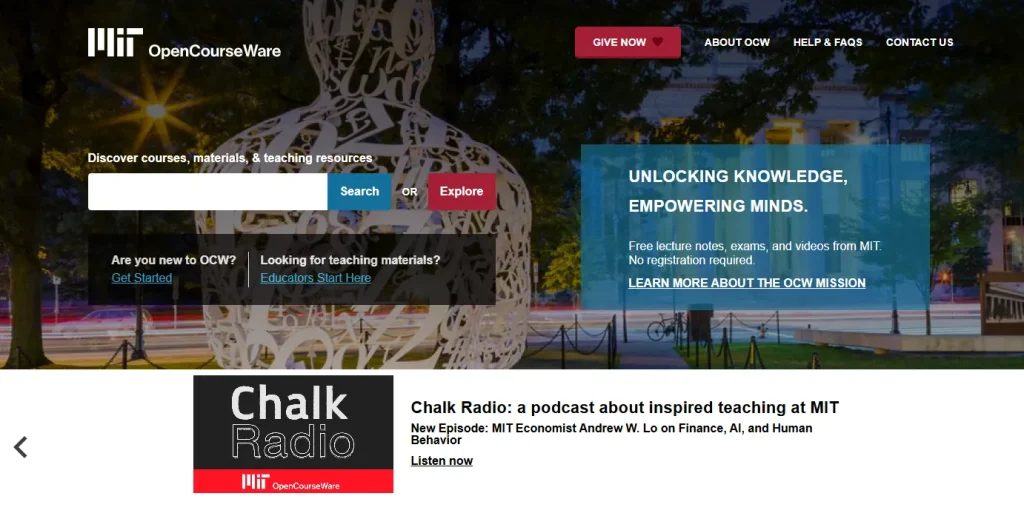
MIT OpenCourseWare (OCW) is the online publication of almost all MIT course content. For those looking for an academic approach to programming, OCW provides comprehensive resources including lectures, notes, and assignments.
One of its standout computer science courses is “Introduction to Computer Science and Programming in Python.” The course covers programming basics as well as topics like algorithms, data structures, and computational thinking.
Although OCW lacks interactive features or a structured platform, it’s a treasure trove for learners who appreciate academic rigor and self-paced study.
Its strength lies in access to genuine university-level content, free for all.
| Website Name | MIT OpenCourseWare |
|---|---|
| Best For | Self-Motivated, Academic Learners |
| Languages Covered | Python, MATLAB, C++, Scheme |
| Free Features | Lectures, Notes, Assignments |
| Unique Feature | Full MIT courses available for free |
9. GeeksforGeeks
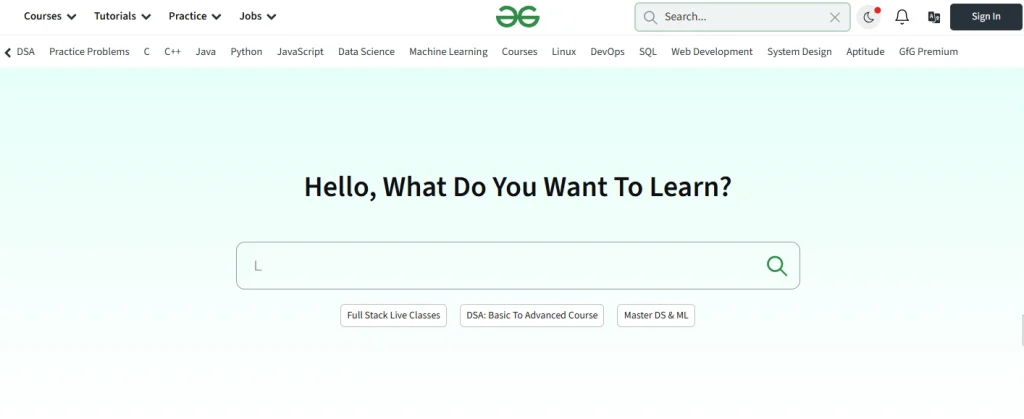
GeeksforGeeks is a staple in the coding world, especially in India and among students preparing for software jobs. It offers detailed tutorials, practice problems, and interview preparation resources.
You’ll find topics ranging from programming basics to advanced algorithms and system design. The coding problems come with explanations in multiple languages and there are even competitive programming sections.
Its unique benefit is a massive library of algorithm-focused content and real interview experiences.
| Website Name | GeeksforGeeks |
|---|---|
| Best For | Interview Prep, Algorithms |
| Languages Covered | C++, Java, Python, JavaScript |
| Free Features | Tutorials, Coding Problems, Quizzes |
| Unique Feature | Huge library of DSA & Interview Prep |
10. MDN Web Docs
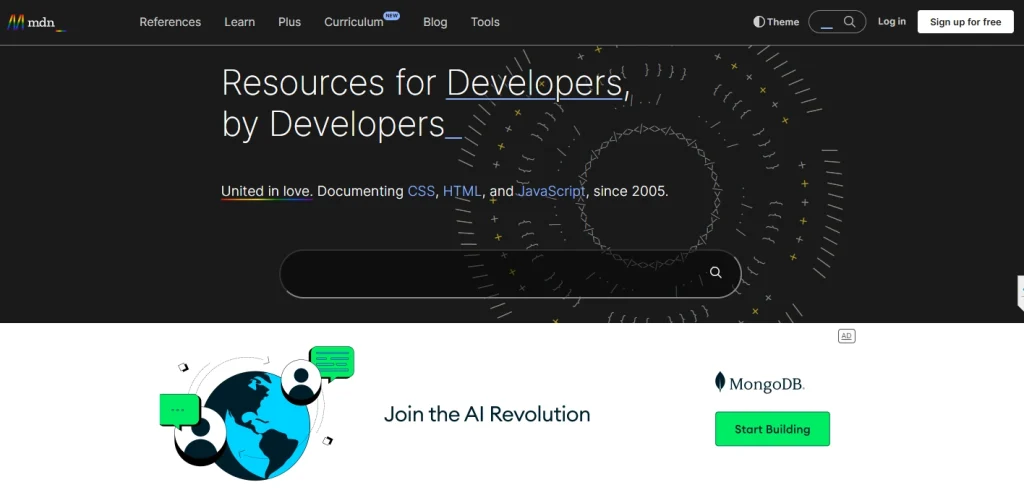
MDN Web Docs (Mozilla Developer Network) is a world-class reference maintained by Mozilla. It’s trusted by developers across the globe for learning web standards and best practices. You can find documentation and guides on HTML, CSS, JavaScript, and Web APIs.
While MDN isn’t structured like a course, it’s invaluable for diving deep into web concepts. It provides examples, compatibility tables, and best practices written and reviewed by industry professionals.
Its biggest strength is accuracy and up-to-date technical reference.
| Website Name | MDN Web Docs |
|---|---|
| Best For | Web Standards & Professional Devs |
| Languages Covered | HTML, CSS, JavaScript, Web APIs |
| Free Features | Documentation, Examples, Tutorials |
| Unique Feature | Most accurate & up-to-date reference |
How to Make the Most of These Free Websites
Free platforms are powerful, but only if you use them wisely. Here are some tips to accelerate your learning:
- Pick one path: Don’t try to learn Python, JavaScript, and C++ all at once. Choose a niche.
- Practice daily: Even 30 minutes a day can build strong coding habits.
- Build real projects: Apply what you learn by making simple websites, games, or scripts.
- Join communities: Many of these platforms have active forums or Discord groups. Use them.
- Don’t fear errors: Bugs are part of the process. Learn to debug, not just code.
And most importantly, stay consistent. Coding is a marathon, not a sprint.
Conclusion
There’s never been a better, or cheaper, time to learn how to code. These top 10 free websites to learn coding offer incredible opportunities for beginners and intermediate learners alike. Whether you’re learning to build a website, automate tasks, or pursue a career in software development, there’s a platform here for you.
Start your coding journey today, and you might just surprise yourself with how far you can go.
Frequently Asked Questions
-
Can I learn coding for free?
Absolutely! Many high-quality websites like FreeCodeCamp, The Odin Project, and CS50 offer entire courses and certifications for free.
-
Which website is best for beginners?
For absolute beginners, Khan Academy and Codecademy’s free plan offer the most approachable, interactive introductions.
-
How long does it take to learn coding?
It depends. You can build simple projects within weeks, but becoming job-ready may take 6–12 months with consistent learning and practice.
-
Do these sites offer certificates?
Yes. Platforms like FreeCodeCamp and CS50 on edX offer free certifications you can showcase on your resume or LinkedIn.
-
Is coding hard to learn?
Coding can be challenging at first, but with the right resources and consistent practice, anyone can learn it, even without a technical background.
-
Can I get a job after learning from free resources?
Definitely! Many developers have landed jobs after learning from The Odin Project, FreeCodeCamp, and CS50—backed by real projects and GitHub portfolios.
-
What language should I start with?
Start with Python for general programming or JavaScript for web development. Both are beginner-friendly and widely used.
























